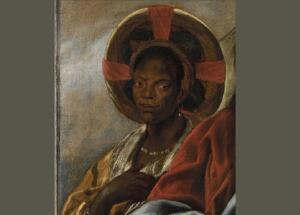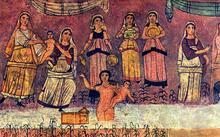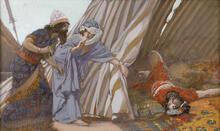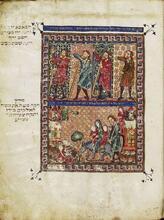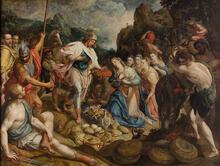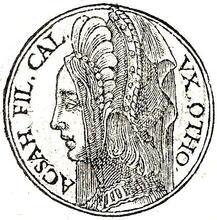Zipporah: Bible
Zipporah is the wife of Moses, given to him in marriage by her Midianite priest father. She heroically saves Moses and her sons from a random attack from an angel by cutting off her son’s foreskin; the explanation for this act is unclear. However, Zipporah is shown as fiercely devoted to her husband, even though he neglects her.
Article
Zipporah is a Midianite woman who becomes the wife of Moses. After Moses kills an Egyptian, he flees from the pharaoh and settles among the Midianites, an Arab people who occupied desert areas in southern Transjordan, northern Arabia, and the Sinai. He meets the seven daughters of Reuel, priest of Midian, at a well; rescues them from shepherds who are harassing them; and fills their jugs with water. In gratitude, Reuel (called Jethro or Hobab in other biblical passages) offers Moses hospitality, then gives him his daughter Zipporah in marriage (Exod 2:21–22). She and Moses have two sons, Gershom and Eliezer (Exod 18:3–4).
Zipporah is the heroine of a bizarre incident that takes place as Moses heads back to Egypt with his wife and sons (Exod 4:20). On their way, at a night encampment, “The Lord met him [Moses] and tried to kill him” (Exod 4:24). No reason is given, just as no reason is given for the angel’s attack on Jacob as he came back from Mesopotamia (Gen 32:24). Jacob was alone and wrestled with the angel all night; Moses is with his wife, who comes to his rescue. She takes a flint and cuts off her son’s foreskin. She then flings the foreskin at “his” feet, declaring that he is hatan damim to her (Exod 4:26). Zipporah’s enigmatic statement has two possible explanations: she flings the foreskin at Moses’s feet, saying, “You are a bridegroom of blood to me” (NRSV), or she flings it at God’s feet, saying, “You are a blood father-in-law to me.” (Damim means “blood,” and hatan can mean either “bridegroom” or “father-in-law.”) Either way, her deed and words stop the attack. The story is already difficult for the narrator, who adds a comment that hatan damim refers to circumcision. The situation remains unclear to us. Zipporah, however, understood it and acted decisively to rescue Moses. Zipporah’s name, meaning “bird,” combined with her protection of Moses, is reminiscent of the fierce loyalty to her husband Osiris of the Egyptian goddess Isis, who is often portrayed as a bird of prey.
Zipporah is not well rewarded. At some point before the exodus from Egypt, Moses sends her and the children away (Exod 18:2). After the exodus, her father, the priest of Midian (here called Jethro), comes to visit Moses, bringing Zipporah and her two sons. Moses is told that his father-in-law Jethro is “coming to see you, with your wife and her two sons” (Exod i8:6). Moses goes out to greet Jethro and takes him into his tent, but nothing is said about his greeting Zipporah.
Moses’ neglect of Zipporah is obvious, as he (not God) tells the men at Sinai not to approach any women in preparation for God’s approach in three days (Exod 19:2). Since he himself is apparently always in preparation for meeting with God, we can infer that he never sleeps with Zipporah. In Num 12:1 Miriam and Aaron speak against Moses because of the “Cushite woman” whom he married, but they do not mention her name. Midrashic tradition assumed they were discussing Moses’ neglect of Zipporah. Other interpreters see the Cushite woman as a second wife, with Miriam and Aaron opposed to the marriage. But no children are ever recorded for a second wife of Moses.
Ashby, Godfrey. “The Bloody Bridegroom: The Interpretation of Exodus 4:24–26.” Expository Times 106 (1995): 203–205.
Meyers, Carol, General Editor. Women in Scripture. New York: 2000.
Pardes, Ilana. Countertraditions in the Bible: A Feminist Approach. Cambridge, MA: 1992.
Propp, William. “That Bloody Bridegroom (Exodus 4:24–26).” Vetus Testamentum 43 (1993): 495–518.
Robinson, Bernard P. “Zipporah to the Rescue: A Contextual Study of Exodus 4:24–26.” Vetus Testamentum 36 (1986): 447–461.

